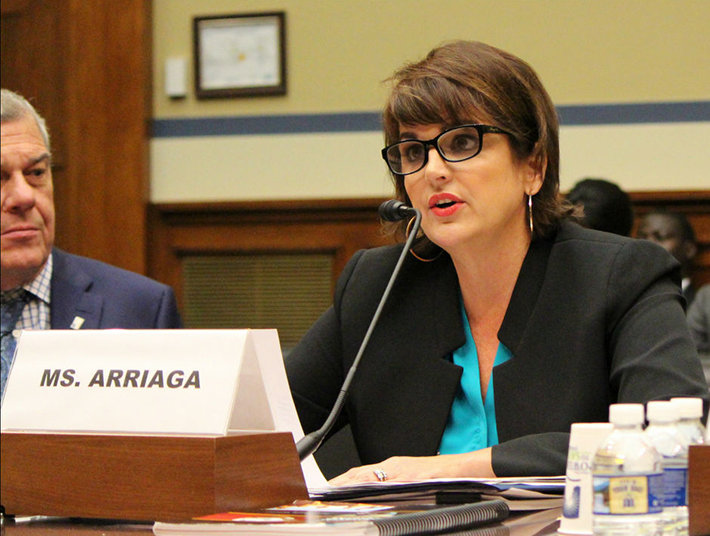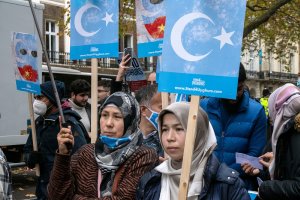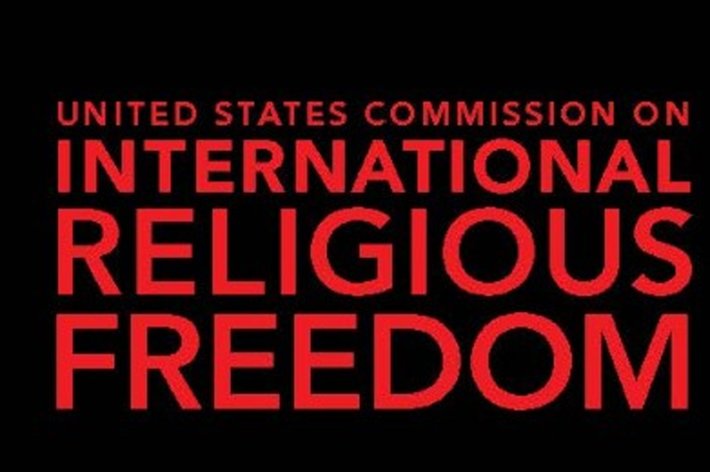On May 21, Speaker of the House Paul Ryan reappointed Kristina Arriaga to the U.S. Commission on International Religious Freedom (USCIRF).

Five days earlier, President Trump appointed Gary L. Bauer, Nadine Maenza, and Johnnie Moore to the Commission.
The U.S. Commission on International Religious Freedom (USCIRF) is an independent, bipartisan, U.S. federal government commission created by the 1998 International Religious Freedom Act (IRFA) that monitors the universal right to freedom of religion or belief abroad. USCIRF uses international standards to monitor religious freedom violations globally, and makes policy recommendations to the President, the Secretary of State, and Congress
The USCIRF website includes brief biographies of these appointees:
- Kristina Arriaga was first appointed to the Commission on May 13, 2016, by Speaker Ryan. Prior to joining the Commission, she served as the Executive Director of the Becket Fund for Religious Liberty, a U.S.-based law firm that defends the free expression of all religious traditions. In this position she launched the only religious liberty clinic in the United States, at Stanford Law School. She also led the firm in various cases to secure the freedom of religion rights of Native Americans, a Sikh service member, and an order of Catholic nuns. Kristina Arriaga also served as Advisor to the United States delegation to the United Nations Human Rights Commission and as an appointee to the U.S. Civil Rights Commission.
- Gary L. Bauer currently serves as President of American Values, a public policy think tank, and as Washington Director of Christians United for Israel Action Fund. In the administration of former President Ronald Reagan, Gary Bauer was appointed Assistant to the President for Policy Development, a position he held until January 1989. Prior to this, he served as Under Secretary of Education from 1985-1987 and Deputy Under Secretary of Education from 1982-1985. After leaving the Reagan White House, Gary Bauer served as a Senior Vice President of Focus on the Family and President of the Family Research Council.
- Nadine Maenza is Executive Director of Patriot Voices, a grassroots and online organization dedicated to helping working families. She is also a founding board member of Hardwired Global, which works to stop religious oppression around the world, and has served as their Chairman since 2015. Nadine Maenza previously worked as the National Finance Director for Rick Santorum for President in 2012 and for Mitt Romney for President in 2008. She also has worked with the Republican Party of Pennsylvania, the Republican National Committee, and several Members of Congress.
- Johnnie Moore is founder and CEO of The KAIROS Company, a public relations consultancy. He began his career at Liberty University, where he served as the school’s Senior Vice President for Communications. After a dozen years at Liberty University, he served as Chief of Staff and Vice President of Faith Content for the United Artists Media Group. Johnnie Moore has advocated for religious freedom in the Middle East and has appeared on numerous television, radio, print and online outlets to provide analysis and commentary on various topics.
In the FAQ section of their website, USCIRF describes the composition and functions of the Commission:
- USCIRF is composed of nine private sector commissioners who volunteer their time in support of USCIRF’s mandate, and the U.S. Ambassador-at-Large for International Religious Freedom, who is a non-voting member. Commissioners are appointed by the President and Democratic and Republican leaders in the House and Senate. USCIRF is a congressionally created entity, not a non-governmental organization, interest group, or advocacy organization.
The Commission:
- Issues an Annual Report by May 1st of each year. The report assesses the U.S. government’s implementation of IRFA; recommends countries that the Secretary of State should designate as "Countries of Particular Concern" for engaging in or tolerating "systematic, ongoing, egregious violations of religious freedom;" documents country conditions in around 30 countries; reports on significant trends; and recommends U.S. policies.
- Documents Religious Freedom Conditions Abroad by meeting with senior government officials, representatives of nongovernmental organizations, religious leaders, victims of persecution, and others in countries including: Afghanistan, Bahrain, Bangladesh, Belarus, Burma, China, Egypt, Ethiopia, Eritrea, Indonesia, Iraq, Nigeria, Pakistan, Russia, Saudi Arabia, Syria, Sri Lanka, Sudan, Tajikistan, Turkey, Turkmenistan, Uzbekistan, and Vietnam.
- Engages Congress by working with Congressional offices, testifying at hearings, and holding briefings on issues including: protecting international religious freedom; Iran’s human rights record under Rouhani; human rights abuses in Egypt; religious minorities in Syria; anti-Semitism; the persecution of religious and indigenous communities in Vietnam; persecuted Uighur Muslims in China; and the plight of prisoners of conscience around the world. With the Tom Lantos Human Rights Commission, USCIRF launched the Defending Freedoms Project, working with Members of Congress to highlight religious prisoners and imprisoned human rights defenders worldwide.
- Issues Reports with Policy Prescriptions, Press Releases, Op-Eds, and Journal Articles including: the global use of blasphemy laws; religious violence in Pakistan; religious freedom provisions in the constitutions of Muslim-majority countries; Russia’s failure to protect religious freedom; the status of religious minorities in Iran; religious violence in CAR; anti-Semitism; and the U.S. government’s treatment of asylum seekers in Expedited Removal.
- Engages Multilaterally in meetings related to religious freedom and tolerance, including at the United Nations, the Organization for Security and Cooperation in Europe (OSCE), the European Union, and with parliamentarians from across the globe.
From its beginnings, the Church of Scientology has recognized that freedom of religion is a fundamental human right. In a world where conflicts are often traceable to intolerance of others’ religious beliefs and practices, the Church has, for more than 50 years, made the preservation of religious liberty an overriding concern.
The Church publishes this blog to help create a better understanding of the freedom of religion and belief and provide news on religious freedom and issues affecting this freedom around the world.
For more information, visit Scientology.org or Scientology.tv.


